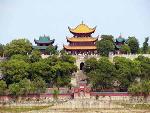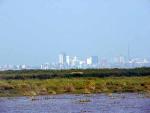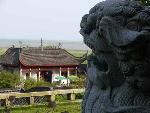- Getting around Lijiang. Dont stay in the Old Towns more than 2 days, there is nothing to do. KRISS Oct 9, 2013 05:46
- 2013 Beijing Temple Fair BENNYLAU Feb 26, 2013 03:29
- Malaysian traveling from KUL - LAX vis Shanghai PVG ZATI_DY Jan 3, 2013 20:15
Bright Eye of the Lake - Junshan Island
- Views: 7024
- |Vote: 1 0
- |Add to Favorites
- |Recommend to Friends
Finding the Path
The waters of Dongting Lake, the second largest freshwater lake in all of China, have seen a lot of history. Hunanese culture developed on its shores, and Hunan's stereotypical lava-hot cuisine arose to inflict itself on the animals and fish in and around the lake area in the concoction of ten thousand delicious peppery recipes. Looking out over the oft-choppy waters, Dongting Lake looks far more like the ocean - the opposite shore is too far away to see, and its surface quivers with near tidal energies.
Just out from Yueyang City on the lake's shore, the island of Junshan Dao is an unusual and alluring sight. Quite possibly the northernmost island in the country with a distinct tropical flavour, the island has been famous for centuries for its natural, park-like atmosphere - and I wasn't about to spend another vacation in Yueyang without going to see it.
Fortunately, there are several departure points from Yueyang, and the most well-serviced one was very convenient from where I was staying, right next to the famous Yueyang Tower, the most well-known historical site in the city. The tower used to stand at the entrance to Yueyang's old port, once the city's main avenue for trade - the lake had been artificially connected to the great Yangtse River, allowing Yueyang to join China's greatest waterborne trading route.
It was when I was still visiting the tower that I was made aware that I could set out for the island from the nearby dock - as I was about to leave, a ticket seller approached me and began to extol the delights of the island. I'd already decided to go, and so didn't really need to hear her spiel, but I was curious as to why she was trying to get customers from within the tower complex.
"A lot of tourists don't know about the island", she said, "or otherwise don't know how to get there. Our city is trying hard to develop our tourism industry now, so we are taking the opportunity to catch tourists while they're visiting the tower to let them know there are other things to see here."
I bought a return speedboat ticket - 40 yuan - and headed out to the northern end of the tower enclosure to hunt down the wharf. Just where the northern wall corners off, I saw a young girl sitting on a wooden chair talking with a friend next to a barely-distinct clay path sloping down towards the lakeside.
I pointed in the direction of the path and said, "Junshan Dao?"
She glanced and me momentarily and nodded, waving a finger half-heartedly in the direction where the path led. I smiled back and started edging down the slope, reflecting that if Yueyang is trying to develop its tourism industry, it has a long way to go.
Minutes later I was facing Yueyang's impressive old harbour building. Although it did rather appear as an abandoned old warehouse might, the exterior was clearly of a unique traditional design, but it was also obvious that years of neglect had taken away some of its shine. Perhaps it was a little more magnificent in this old, tired condition, and I wondered how long it would take for the overenthusiastic Yueyang progress machine to tear it down and replace it with something both expensive and hideous.
A long dock stretched into the lake, where a broad two-storeyed ferryboat sat waiting for passengers. My ticket was for the speedboat, however - which reaches the island in about 15 minutes - and I was directed to the side where a dangerous looking craft was already almost full. We set out quickly, spray hurtling over us from half-closed windows, and I turned back to watch the dock recede - poised grandly above was the stately Yueyang Tower - historically, this would have been the first view of Yueyang visitors arriving from the river would have met with - and it is possibly the most memorable angle on the city that exists.
Island of Long Ago
There are a couple of good reasons why Junshan Dao has a prominent place in Chinese history. One of the most important festivals in China, Duanwu Jie, otherwise known as the Dragonboat Festival, is intimately connected with the place in legend. Back in those times, Yueyang and the Dongting region was part of a country-state called Chu. Just as cultured in literature has it has been ever since, the area was home to a famous poet who was known as Qu Yuan. He was an exceptionally eloquent lyricist and was well loved at the time - not only within his own country but in neighbouring unfriendly states as well.
It was a time of frequent wars, and as it happened, the country soon fell under attack, and before long had fallen to the kingdom of Qin. Qu Yuan, who had been criticised for warning of the danger from Qin, realised that his fine hair brush which he used to compose his verses would be put into the service of the invading Qin king, and unable to bring himself to write poetry for the conquerors, he threw himself into the waters of Dongting Lake and let the hungry swell seep into his silken robes and drag him to the lake bed.
The following morning, when the local people discovered what had occurred, crowds of mourning admirers set out in long boats in search of his body. Afraid that the fish would find him first and eat his flesh, the townspeople threw rice dumplings into the water to attract them as they searched, ultimately in vain, for their beloved poet.
In his memory, a tradition of racing these long boats - called dragonboats - arose in the lake, and this tradition continues today, having spread over the entire country. Most people mark the dragonboat festival by eating boiled eggs and zongzi, the rice dumplings once thrown into the lake by the searchers, and by wearing a cotton wristband - it is said that if the wearer doesn't remove the band until the day of the next rainfall, and then immediately tears it off and throws it into the rainwater, it will carry out to the river and become a fish.
The other reason for which Junshan Dao is famous is that it is where Yueyang's famous Silver Needle Tea is grown. The long, light-gray buds of the plant make for a delicate brew that once won the favour of the great Qianlong Emperor, and it subsequently became an item of imperial tribute, an honour for the growers of the age. Nowadays the tea is Yueyang's chief tourist item on sale, and it's not cheap - but a hundred RMB will buy a modest, sweetly decorated tin of the tea - an ideal gift for a Chinese friend.
On the Island
Junshan Island today is charming. Our boat pulled into the flat marshland surrounding the mountainous slopes, often flooded in rainier seasons but at this time as sweet as a pastureland of grasses. I made my way to the grand stairway and paid the hefty visitor's fee - RMB 60 - to enter.
Junshan Dao is replete with compelling attractions and it's worth taking a whole day to explore there. Wide lawns edged in rows of palm trees are punctuated by white classical structures in pure traditional styles, brilliant on a sunny day. Undulating rises across the island are carpeted with tea bushes, and the very air caries the fragrance of the celebrated tea grown there.
I spent the afternoon visiting the palatial temples, historical sites and sculptured landscapes that feature on the island. It was starkly impressive - this is a park that has been shaped with the utmost care, and stood in contrast to the heavy renovation work currently underway in the city area of Yueyang.
Visitors to the island will certainly want to visit some of the unique attractions. Close to the wharf, the 'Poem Reading Hall' is adorned in the style of a temple, with a resident deity standing solemnly on the highest level, where literary types may take the opportunity to read verse into the lake breeze, as has been done across the ages. A little way down towards the shoreline, visitors can visit the tomb of the two Empresses of the Shun Emperor, a quiet place with a distinct picnic-like atmosphere, and very near the enormous Temple to the Queen of Xiang. Further curiosities include the Cave of the Apes and the queerly monikered Well of Dragon's Drool. Junshan Dao's unusually florid list of attractions makes for a particularly out-of-the-ordinary day's sightseeing, and I discovered the island to be the highlight of my whole visit to Hunan.
Strolling amongst the fragrant tea bushes and looking out to the distant Yueyang Tower on the opposite shore, I felt that I was standing in a part of China that is truly timeless. Looking out over the Dongting Lake, at a view that has scarcely changed at all over the millennia of Chinese civilisation, my visit to Junshan Dao was a chance to turn the pages of an ancient Chinese work and feel for a moment intimately close with the noble tangle of Chinese history.






 Copyright © 1998-2026 All rights reserved.
Copyright © 1998-2026 All rights reserved.